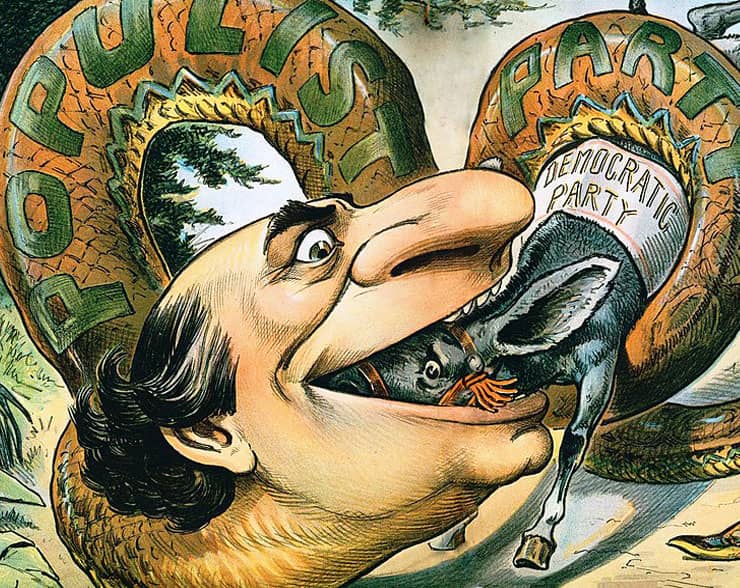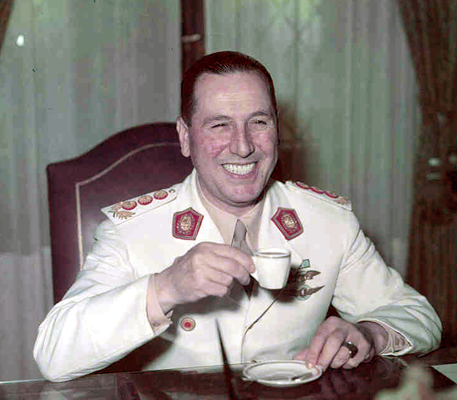 Book Reviews
Book Reviews
Transformation of Populism in Europe and the Americas: History…
Featured Image: 1896 Judge cartoon shows William Jennings Bryan/Populism as a snake swallowing up the mule representing the Democratic party. By US “Judge” magazine, 1896., Public domain, via Wikimedia Commons.
John Abromeit, Bridget M. Chesterton, Gary Marotta, York Norman (Eds).
Transformation of Populism in Europe and the Americas: History and Recent Tendencies (London: Bloomsbury Academic, 2016, 354pp.)
On 12 December 2015, Benedict Anderson; the British historian, author of the widely cited 1983 book: Imagined Communities died. In this influential study of nationalism; he saw nationalism as a possible imaginative process that allows to feel solidarity for strangers.
He wrote:
“In an age when it is so common for progressives, cosmopolitan intellectuals (particularly in Europe?) to insist on the near-pathological character of nationalism; its roots in fear and hatred of the Other, of its affinities with racism; it is useful to remind ourselves that nations inspire love and often profoundly self-sacrificing love…The cultural products of nationalism − poetry, prose fiction, music, plastic arts − show this love very clearly in thousands of different forms and styles.”
The rise of Hitler and the Nazis.
However, as a cosmopolitan intellectual, looking at the reactions to the flow of migrants and refugees to Europe, and to the results of some recent elections with a sharp rise in populist nationalism; I am among those who stress the near-pathological character of nationalism.
The editors share my fears. The longest section of the book is devoted to the way scholars analyze the rise of Hitler and the Nazis during the Weimar Republic. While nationalist sentiments and the Staklhelm predated Hitler; Hitler and the small group around him were able to mobilize the periphery against the center; even the conservative center; and thus to give voice to those who found themselves excluded from a meaningful role in German political life.
Yet as Larry Jones notes, in his contribution-one must not lose sight of the fact that:
“the Nazi assault against the Weimar Republic was not a movement that somehow arose spontaneously out of the frustration, hardship, and suffering of those in German society; who had been marginalized by the course of German political and economic; development since the beginning of the First World War; but a highly centralized and carefully controlled campaign that relied upon a party organization”… with an iron discipline that left little autonomy or capacity for spontaneity.“

At Institute for Humanist Studies dinner honoring Larry Jones’s Humanism, Aug. 24, 2013. By Roy Speckhardt, CC BY-SA 3.0 <https://creativecommons.org/licenses/by-sa/3.0>, via Wikimedia Commons.
“Populism as an Identity: Four Propositions on Peronism”.
Only Juan Peron; who came to power in a military coup in 1943 in Argentina; consciously incorporated many of the Nazi techniques and symbols. However, as Mathew Karush stresses in his chapter “Populism as an Identity: Four Propositions on Peronism”; Peron drew support from a fairly wide group of people, which made his populism lack a specific and consistent ideology. While Peron and similar Latin American leaders were not democrats; they did not have the ability to kill those with different ideas on the scale of the Nazi.

General Juan Domingo Perón has a coffee. By Pinélides A. Fusco, Public domain, via Wikimedia Commons.
“Populist Radical Right Parties in Europe Today”.
Therefore, as Cas Mudde in his analysis of “Populist Radical Right Parties in Europe Today” notes “Today populist radical right parties share a core ideology ; that combines (at least) three features: nativism, authoritarianism, and populism”. Nativism entails a combination of nationalism and xenophobia − an ideology that holds that a State should be inhabited exclusively by members of “the nation” and that “alien” elements, whether persons or ideas, are fundamentally threatening to the homogeneous “nation-state”.
Populist radical-right parties are experiencing their biggest electoral and political success in post-war Europe, but fortunately, neither Marine Le Pen, nor Geert Wilders is Adolf Hitler. Therefore, there is a crucial role for us “cosmopolitan intellectuals”.

Cas Mudde at Forum / Debate in KulturhusetStadsteatern in Stockholm on March 5, 2018 in a conversation about how liberal democracies can defend themselves against extremism without giving up basic values. By Frankie Fouganthin, CC BY-SA 4.0 <https://creativecommons.org/licenses/by-sa/4.0>, via Wikimedia Commons.
Non-Governmental Organization and The “National Heros”.
The populist right parties play on a loss of confidence in the major political parties, as well as in the civil servants of the European Union. We have little influence on the ways the major political parties operate and even less influence on the European Union secretariat.
Thus, our role is to develop strong civil society – non-governmental organization walls by protecting human rights; and by dealing creatively with migrants and refugees. Our role is not only to defend but also to counter-attack. We need to develop more strongly our cosmopolitan ethos.
We need to develop counter-myth figures to the “national heros”. We need to stress the unity of humanity as opposed to national-ethnic identities. We must take the current populist-nationalist efforts seriously and to develop an organized response.
Rene Wadlow, President, Association of World Citizens.

President, Association of World Citizens (AWC).
Estudied International relations in The University of Chicago.
Estudied Special Program in European Civilization en Princeton University
Here are other publications that may be of interest to you.
Burma’s Crumbling Junta
February first marked the anniversary of the military coup which overthrew the government of Aung San Suu Kyi in 2021. She was in practice the leader of the government but…
Preventing the Expansion of the Gaza Conflict: Are Peace Brigades a Possibility?
Antony Blinken, the U.S. Secretary of State, has been again in the Middle East working to prevent the violence of the Gaza Strip of spreading to much of the area. …
World Citizens Call for an Inmediate End to Hostilities between Israel and Hamas, and for a Genuine Peacebuilding Effort in the Middle East.
Featured image: The impact of the Israeli bombing on a civilian building in Gaza (2021). By Osama Eid, CC BY-SA 3.0 https://creativecommons.org/licenses/by-sa/3.0, via Wikimedia Commons. The AWC, a Nongovernmental Organization…
World Humanitarian Day: A Need for Common Actions.
Featured Image: Photo by Wylly Suhendra on Unsplash. The United Nations General Assembly has designated 19 August as “World Humanitarian Day” to pay tribute to aid workers in humanitarian service…
Peace Planners: Awake!.
Featured Image: Photo by Eddie Kopp, Unsplash. The recent NATO Summit in Vilnius is an indication that the war planning community is busy at work in the spirit of Von…
Track Two Efforts Needed to Reduce China-India Frontier Tensions.
Featured Image: Arunachal Pradesh – India. Photo by Unexplored Northeast, Unsplash. There has been a constant buildup of military forces by the governments of both India and China along their common frontiers. …
Democratic Republic of Congo: Sky Getting Darker.
Photo by jorono, Pixabay. The armed conflict in the eastern area of the Democratic Republic of Congo (RDC) on the frontier with Rwanda seems to be growing worse and is…
World Refugee Day.
June 20 is the United Nations (UN)-designated World Refugee Day; marking the signing in 1951 of the Convention on Refugees. The condition of refugees and migrants has become a “hot”…
4 June: Memories of Tiananmen Square.
4 June makes the security forces in China somewhat uneasy, especially in Hong Kong where, in the past, there were large memorial meetings tp remind people of 4 June 1989…
International Day of the Oceans.
Featured Image: Photo by Marek Okon, Unsplash. Progress on Asian Maritime Delimitations Needed. 8 June has been designated by the United Nations General Assembly as the International Day of the Oceans to…









